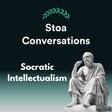
The First Cynic | Antisthenes (Episode 171)
Caleb and Michael discuess teacher of Diogenes and the grandfather of Stoicism. Before there were Stoics arguing about virtue, there was Antisthenes. A warrior turned philosopher who studied under Socrates.
(02:40) Antisthenes The Man
(07:32) Cynicism
(12:42) How To Become Cynical
(21:27) Virtue is Action
(23:58) Socratic Influence
(27:02) Antisthenes in Action
(29:38) Death
(34:34) Irreverance
(36:09) The Point of Philosophy
(39:08) Cynicism and Stoicism
***
Subscribe to The Stoa Letter for weekly meditations, actions, and links to the best Stoic resources: www.stoaletter.com/subscribe
Download the Stoa app (it’s a free download): https://stoameditation.com/pod
If you try the Stoa app and find it useful, but truly cannot afford it, email us and we'll set you up with a free account.
Listen to more episodes and learn more here: https://stoameditation.com/blog/stoa-conversations/
Check out our Youtube: https://www.youtube.com/@stoaphilosophy
Thanks to Michael Levy for graciously letting us use his music in the conversations: https://ancientlyre.com/



















